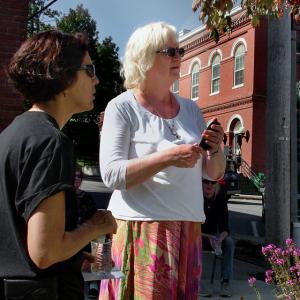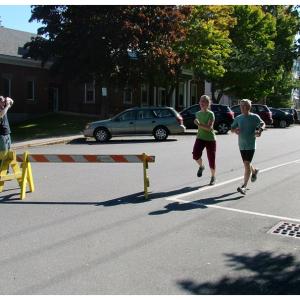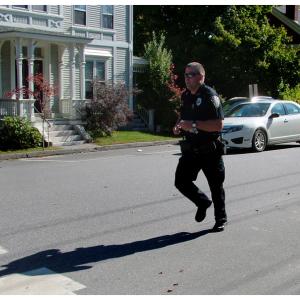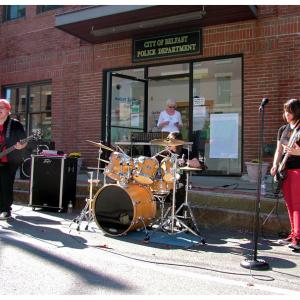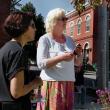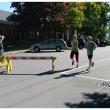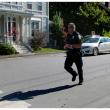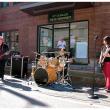In historically-underground recovery scene, a new Belfast group wants to be noticed
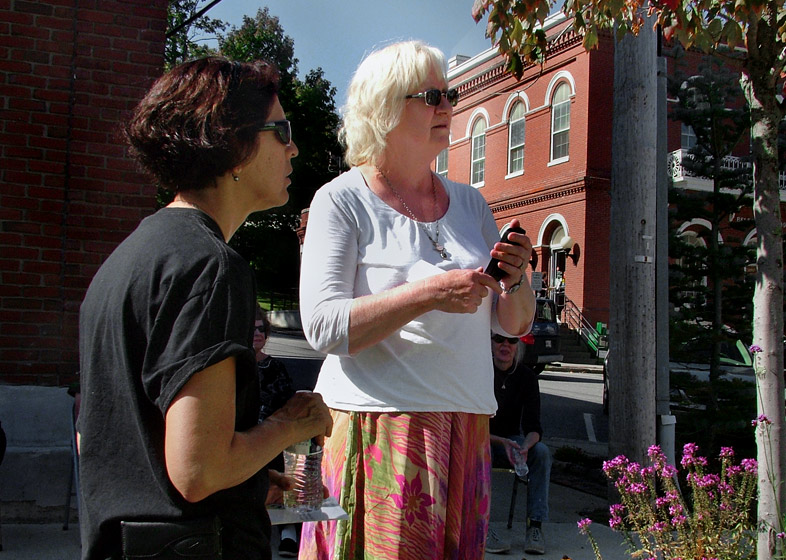 Pat Kaplan (right) and Teri Blackadar at a 5K race sponsored by WeCARE, a consortium of social services groups, health care organizations and law enforcement agencies started by Kaplan to raise awareness about substance addiction and advocate for people seeking recovery. (Photo by Ethan Andrews)
Pat Kaplan (right) and Teri Blackadar at a 5K race sponsored by WeCARE, a consortium of social services groups, health care organizations and law enforcement agencies started by Kaplan to raise awareness about substance addiction and advocate for people seeking recovery. (Photo by Ethan Andrews)
 Runners cross the finish line at a 5K sponsored by WeCARE, Sept. 27. (Photo by Ethan Andrews)
Runners cross the finish line at a 5K sponsored by WeCARE, Sept. 27. (Photo by Ethan Andrews)
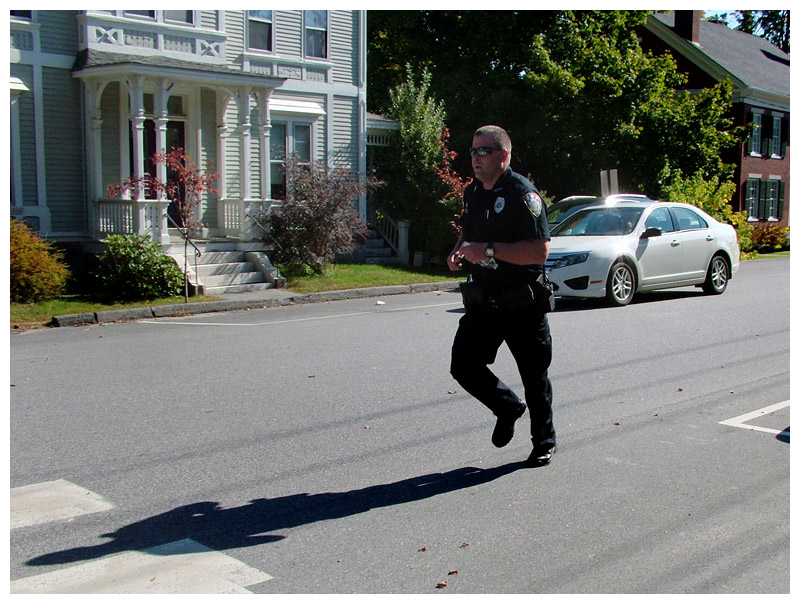 Belfast Police Officer Rick Smith ran the 5K in full uniform, including boots, a bulletproof vest, and guns to show support for WeCARE. (Photo by Ethan Andrews)
Belfast Police Officer Rick Smith ran the 5K in full uniform, including boots, a bulletproof vest, and guns to show support for WeCARE. (Photo by Ethan Andrews)
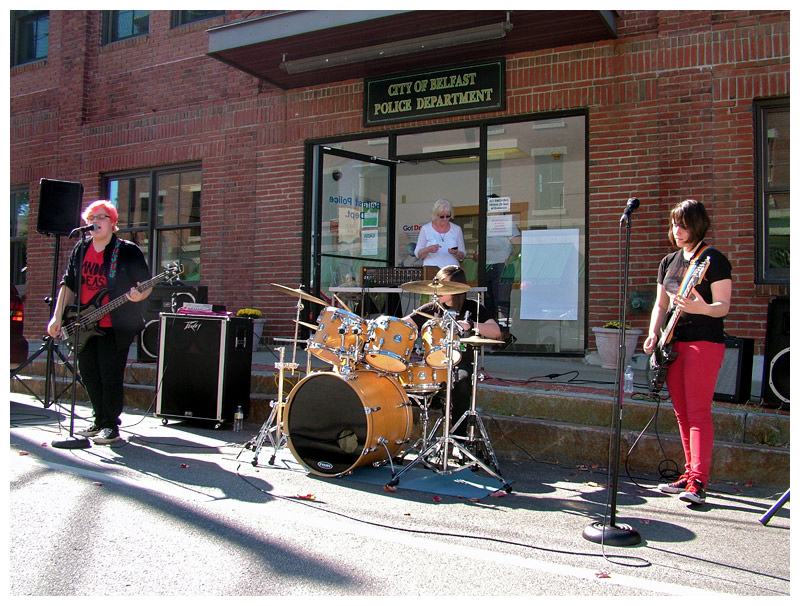 Random Idea performs on Church Street, at the end of a 5K run sponsored by WeCARE. (Photo by Ethan Andrews)
Random Idea performs on Church Street, at the end of a 5K run sponsored by WeCARE. (Photo by Ethan Andrews)
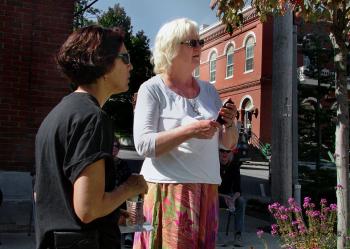 Pat Kaplan (right) and Teri Blackadar at a 5K race sponsored by WeCARE, a consortium of social services groups, health care organizations and law enforcement agencies started by Kaplan to raise awareness about substance addiction and advocate for people seeking recovery. (Photo by Ethan Andrews)
Pat Kaplan (right) and Teri Blackadar at a 5K race sponsored by WeCARE, a consortium of social services groups, health care organizations and law enforcement agencies started by Kaplan to raise awareness about substance addiction and advocate for people seeking recovery. (Photo by Ethan Andrews)
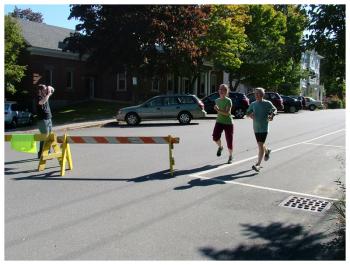 Runners cross the finish line at a 5K sponsored by WeCARE, Sept. 27. (Photo by Ethan Andrews)
Runners cross the finish line at a 5K sponsored by WeCARE, Sept. 27. (Photo by Ethan Andrews)
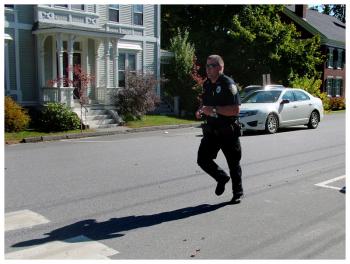 Belfast Police Officer Rick Smith ran the 5K in full uniform, including boots, a bulletproof vest, and guns to show support for WeCARE. (Photo by Ethan Andrews)
Belfast Police Officer Rick Smith ran the 5K in full uniform, including boots, a bulletproof vest, and guns to show support for WeCARE. (Photo by Ethan Andrews)
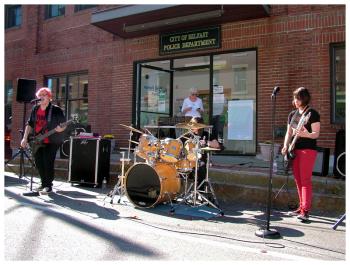 Random Idea performs on Church Street, at the end of a 5K run sponsored by WeCARE. (Photo by Ethan Andrews)
Random Idea performs on Church Street, at the end of a 5K run sponsored by WeCARE. (Photo by Ethan Andrews)
BELFAST – Pat Kaplan wants to bring the problem of drug and alcohol addiction out in the open.
How much out in the open?
“I can picture a sign, ‘Our town Belfast: a recovery community,’” she said.
If that slogan suggests a city populated by addicts, it also plays to a point that Kaplan and others in a new consortium of social service groups, health care organizations and law enforcement agencies working under the banner of WeCARE (Waldo Community Assisted Recovery Efforts) are trying to make: addiction cuts across all levels of a community, and it carries a stigma that keeps people from seeking help.
The wide range of players involved with WeCARE speaks to the belief among members that a lot of what lands people in hospitals and jails has roots in addiction.
The idea for WeCARE came to Kaplan in May at a screening of The Hungry Heart — a film about a doctor in Vermont trying to navigate the use of suboxone for opiate addiction. During a Q&A afterward, she raised her hand and made a statement that would become a kind of catch phrase for WeCARE: Recovery needs to come out of the basement.
The reference was to Alcoholics Anonymous and other 12-step programs known for meeting in church basements and otherwise out of sight. Kaplan recently clarified that she didn’t mean AA and other “anonymous” programs should change venues, just that the public conversation around recovery needs to come out into the open.
Still, the “anonymous” groups weren’t happy about being called out according to some WeCARE members. Others acknowledged a complex relationship between the established groups and their own essentially contradictory approach.
“Twelve step groups are one of the most successful methods,” said Albert Blackadar a nurse practitioner at Waldo County General Hospital and WeCARE member. “But one of the foundations of 12-step groups is anonymity.”
Before he came clean 19 years ago, Blackadar was anonymous in a different way. He was secretly using a lot of drugs — “You name it. But it was cocaine that brought me to my knees,” he said. Getting caught, he said, was instrumental in his recovery.
“I was incredibly relieved,” he said. “It was like an epiphany to have it out in the open.”
His wife, Teri Blackadar, said the community’s approach to addiction should be the same as with any disease.
“When you have cancer, you don’t get labeled a ‘cancerholic,’” she said.
Critics would point to the element of personal choice, but Teri Blackadar said predisposition toward addiction makes it more of a lottery.
For Michael Connors of Searsport, getting caught wasn’t enough to make him seek help. While serving time in county jail, he continued to use heroin when he could get it. It wasn’t until he went through the re-entry center in Belfast that he was able to get help and stay sober.
“I never aspired to be an addict. That wasn’t a goal in my life,” he said. “All I did was hurt people and try to get the next fix.”
Connors, who now works with WeCARE, said with counseling and other help, he has been able to redirect that energy toward his own recovery, and the larger cause of bringing attention to the problem of addiction.
He likened the challenge to the one faced by advocates for AIDS prevention and treatment in the late ‘80s and early ‘90s. Activists at the time knew they had to speak out despite the stigma of a sexually transmitted disease and a prevailing societal homophobia.
“Just like they said: silence will kill us,” Connors said.
On Saturday, WeCARE sponsored a 5K run to draw attention to the mission of the group.
The race itself drew fewer than a dozen runners, but a small street party at the finish line on Church Street attracted a number of passersby. In the public setting, openly recovering addicts mingled with people whose relationship with drugs or alcohol was undeclared.
Ethan Andrews can be reached at news@penbaypilot.com
Event Date
Address
United States

